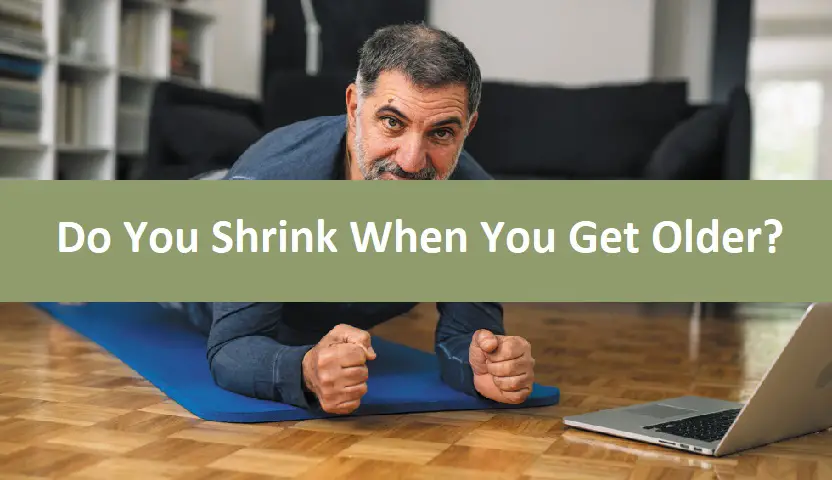As you age, you may notice that you’re not as tall as you used to be. This is because as you get older, you may start to experience bone loss, which can cause you to shrink.
In this guide, we’ll explore the topic of shrinking and osteoporosis, a common condition that affects many seniors. We’ll also look at who’s at risk of developing osteoporosis and discuss some simple steps you can take to prevent it.
Do You Shrink When You Get Older?
Yes, it’s true that many people do shrink as they get older. This is because your bones lose density and become weaker as you age. As a result, they may compress and cause you to lose height. The amount of height you lose can vary depending on a number of factors, such as your gender, genetics, and lifestyle habits.
How Much Do You Shrink When You Get Older?
On average, people lose about half an inch of height every decade after age 40. However, some people may lose more height than others due to factors such as genetics or a history of osteoporosis. Additionally, women tend to shrink more than men, as they experience more rapid bone loss after menopause.
What Is Osteoporosis?
Osteoporosis is a condition in which your bones become weak and brittle, making them more prone to fractures. It’s often called the “silent disease” because it can develop slowly over many years without any noticeable symptoms. Osteoporosis can affect any bone in the body, but it’s most common in the spine, hips, and wrists.
Who’s at Risk of Osteoporosis?
Osteoporosis is more common in women than men, especially those who have gone through menopause. Other factors that can increase your risk of developing osteoporosis include:
- Age: The older you are, the greater your risk of developing osteoporosis.
- Genetics: If you have a family history of osteoporosis, you may be more likely to develop the condition.
- Lifestyle habits: Smoking, excessive alcohol consumption, and a lack of exercise can all increase your risk of developing osteoporosis.
- Certain medical conditions: Certain medical conditions, such as rheumatoid arthritis or celiac disease, can increase your risk of osteoporosis.
Preventing Osteoporosis
To prevent osteoporosis and keep your bones strong as you age, you can adopt habits that promote bone health. The following tips can help you maintain strong bones:
1. Get Enough Calcium and Vitamin D
Calcium and vitamin D are two essential nutrients for bone health. Calcium is the building block of bones, while vitamin D helps your body absorb calcium. You can get calcium from dairy products, leafy greens, and fortified foods.
When exposed to sunlight, vitamin D can be synthesized by your skin or obtained from fatty fish, egg yolks, and fortified foods. Aim for a daily intake of 1,200 milligrams of calcium and 800-1,000 international units (IU) of vitamin D.
The food pyramid is also a useful tool to help you plan a balanced diet that includes plenty of calcium-rich foods, such as dairy products, leafy greens, and fortified foods.
2. Engage in Weight-Bearing Exercise
Weight-bearing exercises, such as walking, jogging, and strength training, help build and maintain bone density. These exercises stimulate the bone cells to produce new bone tissue, making bones stronger and more resilient. Aim for at least 30 minutes of weight-bearing exercise per day, five days a week.
3. Consider Changing Your Lifestyle
Certain lifestyle habits can increase your risk of osteoporosis. For example, smoking and excessive alcohol consumption can increase your risk of osteoporosis.
Smoking has been shown to decrease bone density, while alcohol can interfere with the absorption of calcium and vitamin D. So if you smoke, it might be a good idea to seek help to quit. Plus, it’s best to limit alcohol to no more than one drink per day for women and two drinks per day for men.
4. Consider Supplements
In addition to a balanced diet and exercise, some people may benefit from taking supplements to prevent osteoporosis. Calcium and vitamin D supplements are commonly recommended, but other supplements, such as magnesium and vitamin K, may also be beneficial.
Remember to talk to your healthcare provider before making any changes to your diet or exercise routine. By following these tips and adopting healthy habits, you can maintain strong bones and reduce your risk of osteoporosis.
Conclusion
While aging can lead to bone loss and shrinkage, there’s no need to despair. By adopting healthy lifestyle habits and taking care of your bones, you can reduce the risk of osteoporosis and maintain a strong and active body.
With a balanced diet, regular exercise, and avoidance of harmful habits, you can keep your bones healthy and continue to enjoy life to the fullest.
Remember, it’s never too late to start taking care of yourself, and with determination and effort, you can maintain your health and independence for many years to come.

Morgan Elfman is a compassionate writer, dedicated caregiver, and passionate advocate for senior well-being. Born and raised with a deep sense of empathy and a natural inclination towards service, Morgan has devoted her life to making a positive impact on the lives of seniors.
As a writer for www.choiceseniorlife.com, Morgan utilizes his skills to create insightful and informative content that addresses the unique needs and challenges faced by seniors and their families. Her articles not only provide valuable information on health, lifestyle, and care options but also strive to inspire and empower seniors to lead fulfilling lives.
